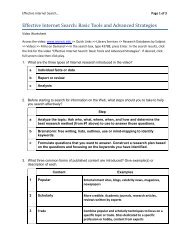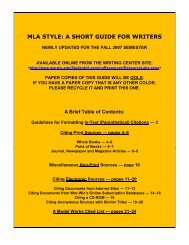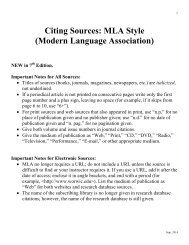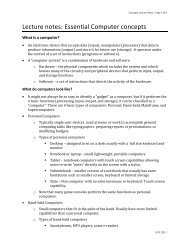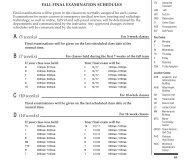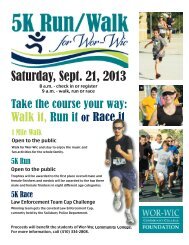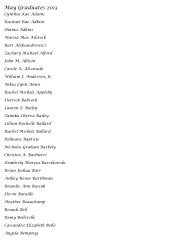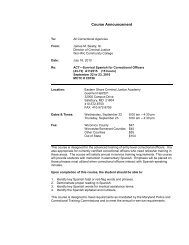Syllabus for ENG 151 01 - Wor-Wic Community College
Syllabus for ENG 151 01 - Wor-Wic Community College
Syllabus for ENG 151 01 - Wor-Wic Community College
You also want an ePaper? Increase the reach of your titles
YUMPU automatically turns print PDFs into web optimized ePapers that Google loves.
5. GRADING: FINAL GRADES WILL BE COMPUTED AS FOLLOWS:<br />
9% Three Reflective Responses (3 x 30 points each) 90 points<br />
9% Three Prewriting Exercises (3 x 30 points each) 90 points<br />
1% Letter of Introduction (1-2 pages) 10 points<br />
15% Essay #1: Poetry (3 pages) 150 points<br />
15% Essay #2: Fiction (4 pages) 150 points<br />
15% Essay #3: Drama (3 pages) 150 points<br />
10% “Did You Read It?” Quizzes (10 x 10 points each) 100 points<br />
2% Literary Terms Quiz #1: Fiction 20 points<br />
2% Literary Terms Quiz #2: Poetry 20 points<br />
2% Literary Terms Quiz #3: Drama 20 points<br />
10% Classwork/Discussion 100 points<br />
10% Final Literature Exam 100 points<br />
100% 1000 points<br />
<strong>ENG</strong> <strong>151</strong>, Page 4<br />
USING A POINT SYSTEM, ALL GRADES WILL BE COMPUTED BY DIVIDING THE TOTAL POINTS EARNED BY THE<br />
TOTAL AMOUNT POSSIBLE (1000). THE BASIC SCALE IS AS FOLLOWS:<br />
A = 90% – 100%<br />
B = 80% – 89%<br />
C = 70% – 79%<br />
D = 60% – 69%<br />
F = below 60%<br />
6. ACADEMIC HONESTY:<br />
Academic Honesty Policy<br />
Academic honesty is expected of all students. Cheating and plagiarism are violations of academic<br />
honesty. Any student who has violated the academic honesty policy will be denied credit <strong>for</strong> the<br />
assignment, and then the matter will be turned over to the Student-Faculty Disciplinary Committee.<br />
Documented evidence of the offense will be kept in the Arts and Humanities Department office.<br />
Plagiarism: In both oral and written communication, the following guidelines <strong>for</strong> avoiding plagiarism<br />
must be followed:<br />
1) Any words quoted directly from a source must be in quotation marks (<strong>for</strong> a written<br />
communication) and cited.<br />
2) Any paraphrasing or rephrasing of the words and\or ideas of a source must be cited.<br />
3) Any ideas or examples derived from a source that are not in the public domain or of general<br />
knowledge must be cited.<br />
4) All papers and presentations must be the student's own work.<br />
SAMPLE<br />
Students who are confused about what constitutes plagiarism should meet with their instructor.<br />
Cheating: Cheating is the act of obtaining in<strong>for</strong>mation or data improperly or by dishonest or deceitful<br />
means. Examples of cheating include copying from another student's test paper, obtaining in<strong>for</strong>mation<br />
illegally on tests, and using unauthorized electronic devices.



